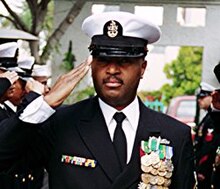An End to al-Qaeda
OCLC 428027220 | | |
| Preceded by | The Terrorists of Iraq | |
|---|---|---|
| Followed by | Defeating ISIS | |
| Website | Official website | |
| [1][2][3][4] | ||
An End to al-Qaeda: Destroying Bin Laden's Jihad and Restoring America's Honor is a non-fiction book about
Nance's work received a favorable book review from
Background

After retiring from military service, Nance founded a consulting company based in
Summary
| Part of a series on |
| Terrorism |
|---|
An End to al-Qaeda describes how Nance believes
The author asserts the United States government must attempt to break the ties between the traditional Islamic population and the extremism offered by al-Qaeda, so that al-Qaeda's source of human resources and influence will be removed. According to Nance, al-Qaeda is attempting to capitalize on decreasing United States influence within the region, and utilize information technology to spread its message.[1][2][3]
An End to al-Qaeda grounds the reader within a background of how the Muslim people globally have greatly changed subsequent to the
The book characterizes al-Qaeda not as an offshoot of Islam but as a destructive religious cult. Nance suggests American federal officials create a position to coordinate actions against al-Qaeda, put together academic gatherings to discuss the matter, and use public relations to counter extremist ideology. Nance praises Barack Obama's oratorical skills, and characterizes the president as a formidable public relations tool to use in achieving these objectives. He emphasizes traditional Muslim people share the same goals and aspirations for their families as U.S. citizens.[1][2][3]
Nance puts forth specific suggestions on how to turn the tide against al-Qaeda's psychological warfare strategies. He backs up his thesis with case studies from his past expertise garnered as an intelligence officer fluent in the Arabic language. There is great emphasis on how much difference can be made by taking great care to use specific verbiage in communication with the Muslim community. Nance calls for a cultural widespread climate of denouncement of al-Qaeda by the Muslim community, through educating believers in Islam about the harms of al-Qaeda's goals to create an extremist Islamic empire.[1][2][3]
Release and reception
The book was first published in hardcover format in 2010 by
Publishers Weekly gave the work a negative review, writing: "Intelligence veteran Nance offers a problematic prescription for defeating al-Qaeda in this disappointing polemic."[3] The review criticized the writing style, calling it, "melodramatic", "preachy", and "pedantic".[3] Kirkus Reviews was critical of the way Nance presented his arguments in the book, concluding, "An often cogent argument weakened by unnecessary repetition and vitriol—reads like a hybrid of a counterinsurgency manual and a consultant's business plan."[2]
See also
- Iraq War
- Islamic extremism
- Islamic fundamentalism
- Islamic terrorism
- War in Afghanistan (2001–present)
References
- ^ , retrieved June 9, 2017
- ^ a b c d e f g h "Book Review - An End to al-Qaeda: Destroying Bin Laden's Jihad and Restoring America's Honor, by Malcolm Nance", Kirkus Reviews, May 20, 2010, retrieved June 9, 2017
- ^ a b c d e f g h i "Book Review - An End to al-Qaeda: Destroying bin Laden's Jihad and Restoring America's Honor", Publishers Weekly, no. 448, November 23, 2009, retrieved June 9, 2017
- ^ ShadowProof, FDL Media Group, retrieved June 9, 2017
- ^ Wolcott, James (March 21, 2017), "5 essential Twitter feeds for keeping up with Trump and Russia", Vanity Fair, retrieved June 7, 2017
- ^ Cabanatuan, Michael (May 21, 2017), "Barbara Lee brings John Dean, Malcolm Nance to town hall meeting", San Francisco Chronicle, retrieved June 7, 2017
- ^ Concha, Joe (February 18, 2017), "Maher: Russian election influence is worst political scandal in US history", The Hill, retrieved June 7, 2017
- ^ Devega, Chauncey (March 14, 2017), "Intelligence expert Malcolm Nance on Trump scandal: 'As close to Benedict Arnold as we're ever going to get'", Salon, retrieved June 7, 2017
- ^ Donahue, Joe (January 5, 2017), "Counterterrorism Expert Malcolm Nance", WAMC, archived from the original on May 29, 2017, retrieved June 7, 2017
- ^ WBUR, retrieved June 7, 2017
- ^ a b c d e Lamb, Brian (April 28, 2017), "Q&A with Malcolm Nance", C-SPAN (video), retrieved June 7, 2017
- ^ a b c d Jones, Layla A. (March 10, 2017), "Philly native is media expert on intelligence", The Philadelphia Tribune, retrieved June 7, 2017
- ^ a b Lipkin, Michael (October 10, 2016), "The Plot to Hack America: How Putin's Cyberspies and WikiLeaks Tried to Steal the 2016 Election", New York Journal of Books, retrieved June 7, 2017
- ^ "Malcolm Nance to present fall 2016 Manatt-Phelps Lecture in Political Science". Iowa State University. August 23, 2016. Retrieved May 28, 2017.
- ISBN 978-1498706896
- ISBN 978-1466554573
- ISBN 978-1510723320
- ISBN 978-1510711846
- ISBN 978-1510718920
- OCLC 428027220
- ^ ISBN 978-0-312-59249-3). 100,000 copies.
- OCLC 932070630
- OCLC 907195826
- OCLC 865109568
Further reading
- Combating Terrorist and Foreign Fighter Travel task force of the ISBN 978-1510712386)
{{citation}}: CS1 maint: multiple names: authors list (link
